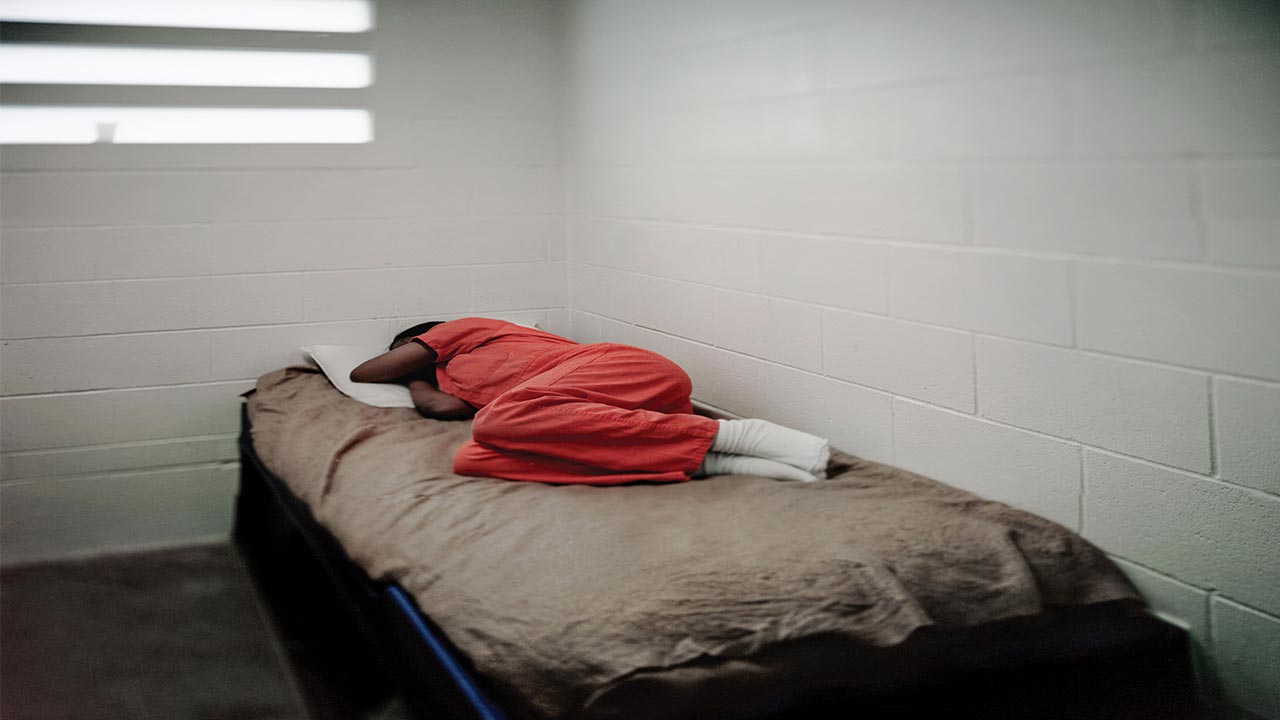Entitled to Treatment: Medical Care for Transgender Adolescents in the Juvenile Justice System
Transgender individuals are those whose “gender identity” – their personal sense of being male or female – does not match the sex they were assigned at birth.
Transgender individuals are those whose “gender identity” – their personal sense of being male or female – does not match the sex they were assigned at birth. Some transgender people describe this as feeling as if they have been born into the “wrong body.”
Changing one’s gender identity is not possible. Unfortunately, many transgender children go without appropriate care and endure such distress and anxiety over the mismatch of their physical bodies with their identities that they suffer from a condition known as gender dysphoria.
Juvenile justice professionals need to know that the failure to provide proper treatment for this condition not only can cause serious health problems for transgender children, it can lead to legal liability for detention facilities. Courts have uniformly held that gender dysphoria is a serious medical condition for which treatment is necessary. Failing to provide it can violate the Eighth Amendment’s ban on cruel and unusual punishment.
Medical treatment for transgender adolescents consists of an individualized protocol that can include psychological, social, and physical interventions.
Medical treatment for transgender adolescents consists of an individualized protocol that can include psychological, social, and physical interventions.
• Psychological interventions can include psychotherapy focused on reducing distress related to gender dysphoria and any other psychosocial difficulties.
• Social interventions can include a partial social transition (e.g., wearing clothing and having a hairstyle that reflects gender identity) or a complete social transition (e.g., also using a name and pronouns congruent with gender identity).
• Physical interventions can include puberty suppression, hormone therapy, or surgery.
Many juvenile detention facilities do not provide appropriate treatment for gender dysphoria and/or may enforce “freeze-frame” policies. A freeze-frame policy prohibits the initiation of gender dysphoria treatment for individuals in custody and allows only the continuation of medical care received prior to detention – without individualized assessments and despite medical need.
Facilities or departments with freeze-frame policies are subject to legal challenges. The Georgia Department of Corrections (GDOC), for example, recently rescinded its policy after the Southern Poverty Law Center filed suit on behalf of a transgender inmate who was denied proper treatment.
From a legal perspective, transgender adolescents in juvenile detention have a right to treatment for gender dysphoria.
Courts have held prisons liable for violating the Eighth Amendment’s ban on cruel and unusual punishment when they have been “deliberately indifferent” to “objectively serious medical needs.”
A juvenile detention facility that is on notice of a youth’s gender dysphoria and denies treatment has created “deliberate indifference.” Courts have uniformly held that gender dysphoria is an “objectively serious medical need” for which treatment is medically necessary.
Freeze-frame policies that simply maintain the level of treatment present at intake are not sufficient to withstand legal challenges. The U.S. Department of Justice (DOJ) has argued that freeze-frame policies constitute cruel and unusual punishment because they fail to provide individual assessment and advancement of treatment for gender dysphoria.
From a medical perspective, it is important for juvenile justice agencies to facilitate appropriate interventions for transgender adolescents, because they may have a relatively narrow window of time to curtail the development of secondary sex characteristics.
In addition, refusing timely medical interventions for adolescents might prolong gender dysphoria and contribute to an appearance that could provoke abuse and stigmatization, contributing to psychiatric distress.
Avoiding Legal Liability and Promoting the Health of Adolescents in the Juvenile Justice System
• Properly assess and treat gender dysphoria among transgender adolescents.
• Evaluate healthcare policies and practices to ensure that transgender youth are receiving appropriate care.
• Identify regional gender identity clinics or physicians with experience treating gender dysphoria in adolescents. If none are available, juvenile detention facilities should facilitate consultations with a provider experienced in treating gender dysphoria in adolescents.
• Permit transgender youth to continue to receive all transition- related treatment they started prior to involvement with the child welfare or juvenile justice agencies. Permit transgender youth to initiate or advance transition-related healthcare.
Juvenile detention facilities should consider adopting and implementing the following model policy. This policy has been adapted from the Massachusetts Department of Youth Services Guidelines for LGBTQQI and GNC Youth as well as the Philadelphia Youth Study Center’s policy on “Non-Discriminatory Treatment of LGBT Youth.”
Counseling, Mental Health, and Substance Abuse
• Clinicians shall offer affirming counseling and information to LGBTQI and gender non-conforming (GNC) youth who are experiencing distress related to their gender identity, gender expression, sexual orientation, or intersex condition.
• All adolescents experience social and developmental challenges. Clinicians shall educate themselves about the additional barriers to mental health faced by LGBTQI and GNC youth; aim to reduce these barriers with open, non-judgmental, and empathetic communication; and help youth to develop their strengths, coping skills, and resilience.
• LGBTQI and GNC youth frequently face stressors related to their gender identity, gender expression, sexual orientation, or intersex condition that other youth do not. Clinicians shall be aware that these stressors may lead to heightened risk of suicide, depression, anxiety, drug use, and school drop-out, and they shall be prepared to treat these issues.
• When youth express a transgender identity or request hormone therapy, they shall be referred to a comprehensive youth gender identity clinic, a psychiatrist with experience diagnosing and treating gender dysphoria in adolescents, or a transgender- affirming psychiatrist who consults with experienced gender identity specialists (listed in order of preference). All efforts shall be made to obtain an appointment within two weeks of the request. All providers shall follow the World ProfessionalAssociation for Transgender Health (WPATH) Standards of Care for treating gender dysphoria.
• Counseling sessions for youth shall include individual opportunities to discuss any gender identity questions or feelings that may arise as a result of having youth in program who are perceived to be “different.”
• Treatment for gender dysphoria shall not be withheld for the purpose of preserving fertility.
• Staff shall not attempt to change a youth’s sexual orientation or gender identity, as this is contrary to accepted practice and has been shown to be potentially harmful.
Medical and Health
• All youth shall have an initial health screening within an hour of their arrival in detention. During this screening, staff shall identify any medications that the youth is currently taking. If a youth indicates that he or she has been undergoing hormone therapy, whether supervised by a medical professional or not, the juvenile detention agency’s medical doctor shall arrange an appointment with a comprehensive youth gender identity clinic, a psychiatrist with experience diagnosing and treating gender dysphoria in adolescents, or a transgender-affirming psychiatrist who consults with experienced gender identity specialists (listed in order of preference). The medical doctor will make this arrangement within one business day of being notified about a youth’s hormone therapy in order to prevent the complications associated with abrupt disruption of treatment and to ensure optimum continuity of care.
• Staff shall provide age-appropriate medical information and health services education for all youth that includes topics related to LGBTQI and GNC health.
Endocrine Society – Hormone Science to Health (endocrine.org)
Human Rights Campaign (hrc.org) – Identifying clinics and providers
Lesbian, Gay, Bisexual and Transgender Youth in the Juvenile Justice System for the Annie E. Casey Foundation (Nclr.org)
RAD Remedy (radremedy.org ) – Connecting to accurate, safe, respectful and comprehensive care
World Professional Association for Transgender Health (WPATH, wpath.org) – Treatment protocol for gender dysphoria included in its Standards of Care for the Health of Transsexual, Transgender, and Gender Non-Conforming People
GNC: gender non-conforming
Gender Dysphoria: severe distress over gender assigned at birth
Gender Expression: the ways people outwardly manifest their masculinity, femininity, and androgyny
Gender Identity: personal sense of male, female or androgyny
LGBT: lesbian, gay, bisexual, and transgender
LGBTQQI: lesbian, gay, bisexual, transgender, queer or questioning, and intersex
Transgender: adjective for a person whose gender identity differs from the sex they were assigned at birth
WPATH: World Professional Association for Transgender Health






